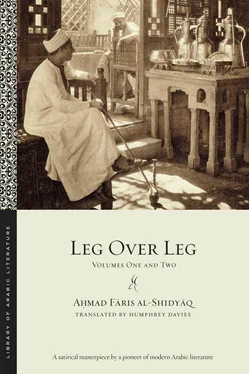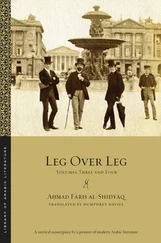1.1.7
In addition, I have imposed on the reader the condition that he not skip any of the “synonymous” words in this book of mine, many though they be (for it may happen that, on a single road, a herd of fifty words, all with the same meaning, or with two meanings that are close, may pass him by). If he cannot commit to this, I cannot permit him to peruse it and will not offer him my congratulations if he does so. I have to admit that I cannot support the idea that all “synonyms” have the same meaning, or they would have called them “equi-nyms.” They are, in fact, synonymous only in the sense that certain of them may take the place of certain others. Proof of this lies in the fact that beauty, length, whiteness, smoothness, and eloquence differ in kind and in collocation, depending on the differences among the objects they describe. The Arabs, 89therefore, assigned to each type of beauty, length, etc., a specific name, and it is only our distance from their days that makes us think they all mean the same; how much more so, then, in the case of words relating to jewelry, food, drink, dress, household furnishings, and footwear. Indeed, in my opinion — and I am not afraid of anyone saying, “Aren’t you being opinionated?”—if two words derive from the same base form and refer to the same object (as is the case for example with khajūj and khajawjāh , meaning “wind that passes violently”), 90the longer of the two forms must involve an extension of meaning. Grant me this, if you wish, or be stubborn — it makes no difference to me. Bear in mind, too, that I composed the work at a time when the only book in Arabic I had to refer to or depend on was the Qāmūs , for my books had taken against me as a wife does her husband, and I’d decided to have nothing more to do with them — though it must be acknowledged that the author of the work in question, God rest his soul, did not fail to record a single word descriptive of women; it is almost as though he knew by divine inspiration that someone would come along after him and dive into his “ocean” 91in order to collect such pearls into a single work where they could be so arranged as to lodge more firmly in the mind and become more deeply rooted in the memory.
1.1.8
And, did I not fear the wrath of these beauties against me, I would have made mention of many of their crafty ways, their stratagems, and their artifices too; however, my intention in writing the book has been to approach closer to them and use it to appease, not anger, them. I am indeed extremely sorry that they will be incapable of understanding it — as a result of their ignorance of reading and not of the recondite nature of its language, for nothing that involves the union of souls, love, or passion, is too hard for them to understand; they take it all in and grasp it without hesitation, deficiency, or incomprehension. Enough for me that the rumor should reach their ears that so-and-so has written a book about women in which he gives them precedence over all other creatures, declaring them to be the adornment of the universe, the comfort and pride of this world, the joy and hope of life, the soul’s pleasure(1) and its desire, the heart’s jewel and the eye’s apple, the breast’s refreshment and spirit’s refection, the mind’s elucidation and thought’s preoccupation, a distraction for the head and paradise for the soul, good cheer for the constitution and limpidity for the blood, pleasure for the senses and diversion for the intellect, the embellishment of the age and the glory of every place and dwelling.
1.1.9
Indeed, I declare unabashedly that they have about them a whiff of the divine, for one can scarce behold a beautiful woman without glorifying the Creator. At their mention, the tongue breaks into praise while the foot runs to serve them, bearing burdens and taking on hardships, and in their service what is difficult seems easy, colocynth may be drunk, injury borne. To please them, what is dear is treated with contempt, what is precious is not spared, what is sacred is trodden underfoot. Without them, a man’s lot of what is good in this world is turned into deprivation, his triumphs become disappointments, his happiness displeasure, his sense of companionship loneliness; where once he was full he hungers, and where once he was watered he thirsts; where once he slept he suffers from insomnia, and where once he was strong he is in tribulation; his felicity turns into misery, Paradise to him is become like the fruit of the zaqqūm tree 92and its nectar like pus.
1.1.10
Thus, if God should ordain that this intoxicating news reach the ears of one of these beautiful mistresses of mine and she is pleased and made happy and dances and is merry, I beg of her, extending the hand of supplication, that she communicate it to the ears of her lady neighbor too, who will show it in turn, I hope, to a friend, so that not a week passes before news of the book has spread throughout the whole city. This will be sufficient reward for the trouble that I have gone to for their sakes. Indeed, they must know that, were I able to write their praise with all my fingers and proclaim it with all my limbs, it would still not be equal to their virtues. How much I owe them for appearing in their finest garb, strutting in the best of their jewelry, and casting me such darting looks that I returned to my little house barely able to hold my thoughts and fancies in check! Then, no sooner did my hand touch the pen than the ideas gushed from it and spread themselves over the paper. Thus women have earned me repute and honor among the public and raised my status above that of the unemployed and idle. True, one among them refused to let her specter visit me in sleep, thinking me unworthy, but she is to be excused because she was unaware that I, in fact, was only feigning sleep, 93after my mind had been dazzled and my brain discombobulated by her beauty.
1.1.11
If, on the other hand, someone should insist that my language is devoid of rhetorical devices — which is to say, not marinated in the spices of paronomasia 94and morphological parallelism, of metaphor and metonymy — I’d say to him, “When I undertook to serve His Honor 95by composing this work, the last persons on my mind were al-Taftazānī, 96al-Sakkākī, 97al-Āmidī, 98al-Wāḥidī, 99al-Zamakhsharī, 100al-Bustī, 101Ibn al-Muʿtazz, 102Ibn al-Nabīh, 103and Ibn Nubātah. 104My thoughts were exercised exclusively by the description of beauty, my tongue tied to the praise of those on whom the Almighty has bestowed this egregious blessing, to the expression of happiness for those to whom He, Great and Glorious, has accorded the glory of comeliness, and to mourning over the fate of those whom He has deprived of it, and this was enough to distract one from everything else. Nevertheless, I hope that the scintillation, the luster, and the decorative nature of the description of beauty will, in and of itself, relieve the book of the need for any such rhetorical embellishments, just as a beautiful woman is relieved of any need for jewelry (which is why she is called a ghāniyah ). 105In addition, experience has shown me that these rhetorical embellishments in which authors so freely indulge often draw the reader’s attention to the words’ outward forms and away from their inner meanings.”
1.1.12
I swear that this book contains nothing reprehensible, unless you find the Fāriyāq’s 106sometimes pushing his way through a troupe of ghāniya s or forcing himself upon them as they rest safe in their bridal pavilions or in a garden or in the corner of a house or on their beds to be so. This was, however, something I was unable to avoid, for the book has been compiled as an account of his doings and to provide knowledge of the circumstances that influenced him, it having come to my attention that many people have denied that the above named even exists and claimed that he belongs to the same category as the ghoul and the phoenix, while others have asserted that he appeared but once throughout the age and thereafter vanished from the stage , and more than one has held that he was transmogrified a few days after his birth and that it is not known what shape he adopted or into what form he mutated. Another party has claimed that he joined the race of the monopods and another that of the monopodettes. 107Still others have said that he joined the ḥinn . 108Some have insisted that he was transformed into a woman, for when he saw that the female enjoys a happier state in this world — this “women’s world,” as it is known — he let not a night go by without praying to his Lord to turn him into a female and God accepted his prayer (and He is capable of all things). This being the case, it seemed to me that one of my duties should be to acquaint these same people, with their differing opinions, with the fact of his presence in the very form that he bore when he was brought into being, due exception made for the changes wrought on him by the efforts he has expended in the pursuit of a living, his difficult circumstances, the hardships of his travels and of consorting with foreigners and learning their languages, and, especially, the graying of his hair and his passage from the borders of youth to the age of maturity.
Читать дальше












